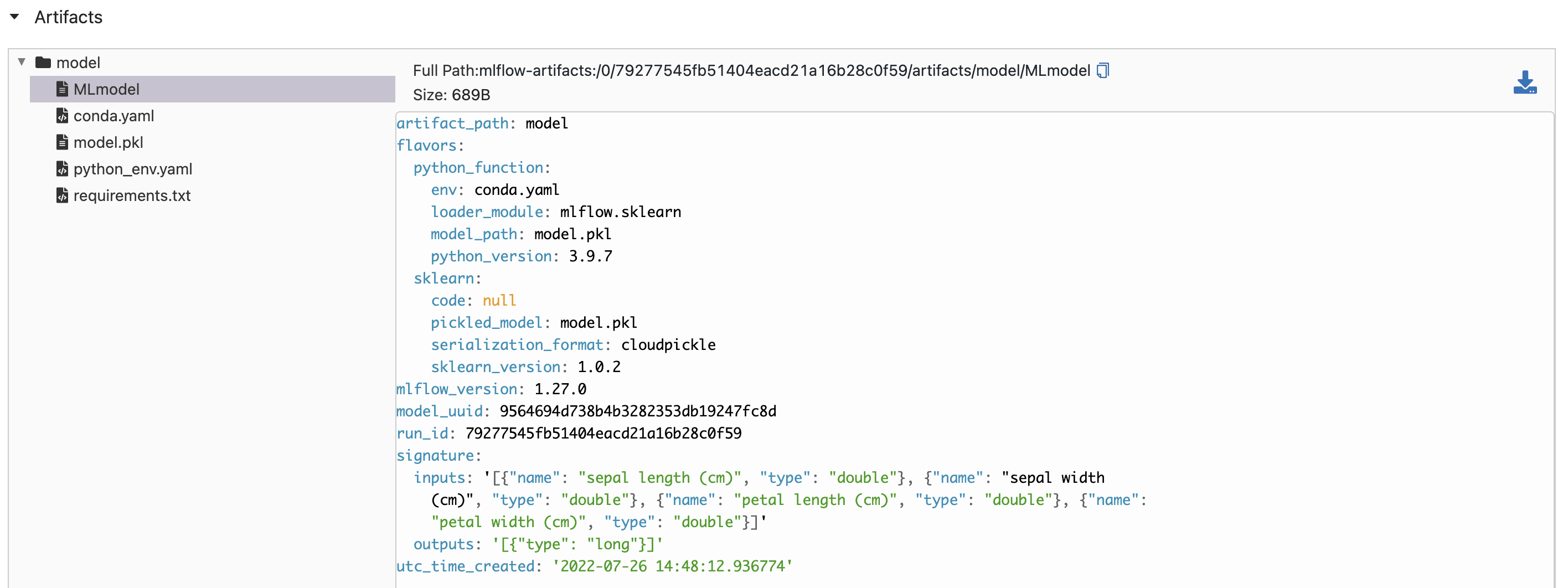[BUG] "No schema" shown on model version page
See original GitHub issueWillingness to contribute
Yes. I can contribute a fix for this bug independently.
MLflow version
1.27.0
System information
- OS Platform and Distribution (e.g., Linux Ubuntu 16.04): Linux version 5.10.104-linuxkit
- Python version: 3.7.13
- yarn version, if running the dev UI:
Describe the problem
When running an experiment and registering a model with a signature, the signature can be seen in the “Artifacts” section on the run page but does not show in the “Schema” section on the model version page.
Run page:

Model version page:

This appears to only be an issue when using the proxied artifact storage set-up described at https://www.mlflow.org/docs/latest/tracking.html#scenario-5-mlflow-tracking-server-enabled-with-proxied-artifact-storage-access.
I was able to fix the issue by modifying the get_model_version_artifact_handler at https://github.com/mlflow/mlflow/blob/master/mlflow/server/handlers.py#L1294 to determine the artifact_path in a similar way to how the get_artifact_handler determines it at https://github.com/mlflow/mlflow/blob/master/mlflow/server/handlers.py#L518
Tracking information
MLflow version: 1.27.0 Tracking URI: http://0.0.0.0 Artifact URI: mlflow-artifacts:/0/0907b0b94e5b4230bde0a177c5a01899/artifacts
mlflow server
--host 0.0.0.0
--port 5000
--serve-artifacts
--artifacts-destination s3://my-bucket
--backend-store-uri postgresql://postgres:postgres@backend-store:5432/mlflow
--gunicorn-opts "--log-level debug"
Code to reproduce issue
Commands to run:
$ docker-compose up --build
$ MLFLOW_TRACKING_URI=http://0.0.0.0 MLFLOW_TRACKING_USERNAME=username MLFLOW_TRACKING_PASSWORD=password python example.py
Files needed:
docker-compose.yml
services:
tracking-server:
build:
context: .
dockerfile: Dockerfile
depends_on:
- backend-store
ports:
- "5000:5000"
environment:
MLFLOW_S3_ENDPOINT_URL: http://mlflow-artifacts:9000
AWS_ACCESS_KEY_ID: AKIAIOSFODNN7EXAMPLE
AWS_SECRET_ACCESS_KEY: aaaaaaaaaaaaaaaaaaaaaaaaaaaaaaaaaaaaaaaa
AWS_DEFAULT_REGION: eu-west-2
command: >
mlflow server
--host 0.0.0.0
--port 5000
--serve-artifacts
--artifacts-destination s3://my-bucket
--backend-store-uri postgresql://postgres:postgres@backend-store:5432/mlflow
--gunicorn-opts "--log-level debug"
nginx-proxy:
build:
context: nginx
dockerfile: Dockerfile
depends_on:
- tracking-server
ports:
- "80:80"
backend-store:
image: postgres:12
volumes:
- ./init.sql:/docker-entrypoint-initdb.d/init.sql
- postgres_data:/var/lib/postgresql/data/
environment:
POSTGRES_USER: "postgres"
POSTGRES_HOST_AUTH_METHOD: "trust"
mlflow-artifacts:
image: minio/minio:RELEASE.2021-10-08T23-58-24Z.fips
environment:
MINIO_ROOT_USER: AKIAIOSFODNN7EXAMPLE
MINIO_ROOT_PASSWORD: aaaaaaaaaaaaaaaaaaaaaaaaaaaaaaaaaaaaaaaa
MINIO_REGION: eu-west-2
ports:
- "9000:9000"
- "9001:9001"
entrypoint: sh
volumes:
- ".minio:/data"
command: ['-c', 'mkdir -p /data/my-bucket && minio server /data --console-address ":9001"']
volumes:
postgres_data:
minio:
Dockerfile
FROM python:3.7-buster
WORKDIR /app
RUN pip install sklearn mlflow psycopg2 boto3
example.py
import sys
import pandas as pd
import numpy as np
from sklearn.metrics import mean_squared_error, mean_absolute_error, r2_score
from sklearn.model_selection import train_test_split
from sklearn.linear_model import ElasticNet
import mlflow
import mlflow.sklearn
from mlflow.models.signature import ModelSignature
from mlflow.types.schema import Schema, ColSpec
def eval_metrics(actual, pred):
rmse = np.sqrt(mean_squared_error(actual, pred))
mae = mean_absolute_error(actual, pred)
r2 = r2_score(actual, pred)
return rmse, mae, r2
if __name__ == "__main__":
np.random.seed(40)
# Read the wine-quality csv file from the URL
csv_url = (
"http://archive.ics.uci.edu/ml/machine-learning-databases/wine-quality/winequality-red.csv"
)
data = pd.read_csv(csv_url, sep=";")
# Split the data into training and test sets. (0.75, 0.25) split.
train, test = train_test_split(data)
# The predicted column is "quality" which is a scalar from [3, 9]
train_x = train.drop(["quality"], axis=1)
test_x = test.drop(["quality"], axis=1)
train_y = train[["quality"]]
test_y = test[["quality"]]
alpha = float(sys.argv[1]) if len(sys.argv) > 1 else 0.5
l1_ratio = float(sys.argv[2]) if len(sys.argv) > 2 else 0.5
with mlflow.start_run():
lr = ElasticNet(alpha=alpha, l1_ratio=l1_ratio, random_state=42)
lr.fit(train_x, train_y)
predicted_qualities = lr.predict(test_x)
(rmse, mae, r2) = eval_metrics(test_y, predicted_qualities)
mlflow.log_param("alpha", alpha)
mlflow.log_param("l1_ratio", l1_ratio)
mlflow.log_metric("rmse", rmse)
mlflow.log_metric("r2", r2)
mlflow.log_metric("mae", mae)
input_schema = Schema([
ColSpec("double", "sepal length (cm)"),
ColSpec("double", "sepal width (cm)"),
ColSpec("double", "petal length (cm)"),
ColSpec("double", "petal width (cm)"),
])
output_schema = Schema([ColSpec("long")])
signature = ModelSignature(inputs=input_schema, outputs=output_schema)
mlflow.sklearn.log_model(lr, "model", registered_model_name="ElasticnetWineModel", signature=signature)
init.sql
CREATE DATABASE mlflow;
nginx/Dockerfile
FROM nginx
COPY nginx.conf /etc/nginx/nginx.conf
COPY htpasswd /etc/nginx/conf.d/htpasswd
nginx/htpasswd
username:jRlgfrjACzG6Y
nginx/nginx.conf
user nginx;
worker_processes auto;
error_log /var/log/nginx/error.log notice;
pid /var/run/nginx.pid;
events {
worker_connections 1024;
}
http {
include /etc/nginx/mime.types;
default_type application/octet-stream;
log_format main '$remote_addr - $remote_user [$time_local] "$request" '
'$status $body_bytes_sent "$http_referer" '
'"$http_user_agent" "$http_x_forwarded_for"';
access_log /var/log/nginx/access.log main;
sendfile on;
#tcp_nopush on;
keepalive_timeout 65;
#gzip on;
server {
location / {
auth_basic "closed site";
auth_basic_user_file conf.d/htpasswd;
proxy_pass http://tracking-server:5000/;
}
}
}
Other info / logs
No response
What component(s) does this bug affect?
-
area/artifacts: Artifact stores and artifact logging -
area/build: Build and test infrastructure for MLflow -
area/docs: MLflow documentation pages -
area/examples: Example code -
area/model-registry: Model Registry service, APIs, and the fluent client calls for Model Registry -
area/models: MLmodel format, model serialization/deserialization, flavors -
area/pipelines: Pipelines, Pipeline APIs, Pipeline configs, Pipeline Templates -
area/projects: MLproject format, project running backends -
area/scoring: MLflow Model server, model deployment tools, Spark UDFs -
area/server-infra: MLflow Tracking server backend -
area/tracking: Tracking Service, tracking client APIs, autologging
What interface(s) does this bug affect?
-
area/uiux: Front-end, user experience, plotting, JavaScript, JavaScript dev server -
area/docker: Docker use across MLflow’s components, such as MLflow Projects and MLflow Models -
area/sqlalchemy: Use of SQLAlchemy in the Tracking Service or Model Registry -
area/windows: Windows support
What language(s) does this bug affect?
-
language/r: R APIs and clients -
language/java: Java APIs and clients -
language/new: Proposals for new client languages
What integration(s) does this bug affect?
-
integrations/azure: Azure and Azure ML integrations -
integrations/sagemaker: SageMaker integrations -
integrations/databricks: Databricks integrations
Issue Analytics
- State:
- Created a year ago
- Comments:5 (1 by maintainers)

 Top Related StackOverflow Question
Top Related StackOverflow Question
Hi @abbas123456. Great question! I think we can address this by setting the
backend_store_uritof'sqlite:///{os.path.join(tmpdir, "mlruns.db")}'here: https://github.com/mlflow/mlflow/blob/f7b19b8dcacff24ddfa535e7a9808cb51bdf96ea/tests/tracking/test_mlflow_artifacts.py#L52I still have the same problem using MLFlow 1.30.0 and scenario 4.